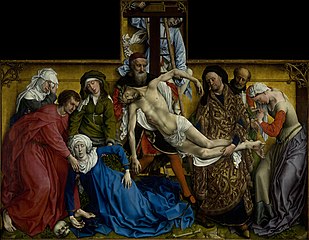
* Rogier van der Weyden, The Descent from the Cross (c. 1435)
What is most appealing with the religious paintings from Early Netherlandish period is the unabashed display of emotions, but besides the apparent tears and frowns, the ingenious painters would resort to other means to represent a mourning state. Amid the saints’ ruffled garb and the scatter of assorted objects that perfectly emphasized an intractable imbroglio is the rather beautifully parallel posture of the descending Christ and the swooning Mary. The orderly arrangement of those two epitomizes the solemnity, or the serenity, of a hallowed death.
People once said when you were born that you resembled a firebird emerging out of an encompassing inferno. The gaping throng marvelled such flaming beauty, but a discreet distance was kept when the sight proved too overwhelming. Not many were aware of the pain that distorted your face when the fire threatening to tear you to smithereens; the pain was a mixed ecstasy of pleasure and agony, likened to the curdling of blood that pitched mercilessly your stomach. The primordial feeling that surged through your breast, although your eyes and ears had yet accommodated to the shifting scenes, was abhorrence.
The abhorrence plagued you so, that eventually it became a self-loathing affliction. You were inclined to wander around the gardens, said you that the evil inside vexed you so, that neither was it proper to internalize in a constricted space, nor were you impudent enough to flaunt your distemper before everyone, but you were told to content yourself in that walled garden, and gleaned the colourful flowers you whiled away your youth. Sometimes you begged me to spurn the looming shadows behind your slouchy self. I scoured to every possible nook to reassure that not a third presence was sharing our enjoyment and company, yet you sighed in disapproval, that not even a slight stir of the nearby bush escaped your notice. Your sense was always sharp, always cautious; to care not a whit was by no means your abiding principle.
I promised to cover everything behind your mass destruction of things. I failed to keep my words, however, should I then act remorseful? When you were insistently dissatisfied with your garden and ventured out, discovering beyond the wall was a world rather the opposite of Eden, everything resulted in collision and you countered. You battled back so hard that something unsavoury tended to happen. I therefore witnessed you prevailing all, claiming all the champions, in which the victory was foreign to you, or you were rather conversant with being your own king in your remote kingdom? The sight of those defeated soliciting any vestige of your mercy with tears, you share them with the people, but mingled with unabated sniggers.
It was deemed miraculous when you survived the conflagration unburnt, but it took comfort habitation within you, the fire, and you suffered to learn fraternizing with it. You harboured the fire like hatching a crystallized jade, selfishly refusing to share it with others. Every time I coaxed you to vent the fire, your impish smile muted my further entreaties. Your eyes were then clouded but the fair weather dispelled everything so fast.
On your very last day and your very last moment, I ask you to smile at your executioner, for his face will be the last dwelling on your mind. Crane your neck slightly and stare into the infinity of the sky, if you still have the spirit to do so, and you will probably find a desperate longing for happiness pounding your heart. I promise you the pain is scarce, and it fleets; the last breath of yours you will dissolve into thin air in form of a red butterfly, and let the reigning coldness descend eventually the world and me.
Comments
Post a Comment